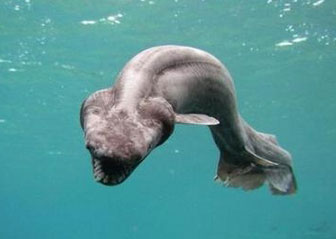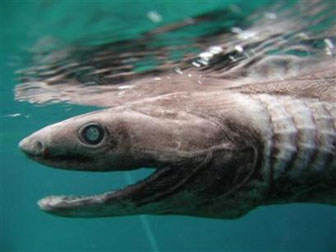  Pictures of the ‘living fossil’ courtesy of Awashima Marine Park in Japan |
A rare frilled shark was captured live by fishermen off the coast of Japan. The toothy eel-like creature was taken to Awashima Marine Park in Shizuoka where it later died, according to Reuters.
The 5-foot (1.6 meter) long beast was believed to be ill because it was found in shallow waters. Generally the species, known as Chlamydoselachus anguineus, lives at a depth of 488-4550 feet (150-1400 m) in the Atlantic and Pacific Oceans.
“We believe moving pictures of a live specimen are extremely rare,” Reuters quoted an official at the park as saying. “They live between 600 and 1000 meters under the water, which is deeper than humans can go. We think it may have come close to the surface because it was sick, or else it was weakened because it was in shallow waters.”
The frilled shark is considered a primitive shark, largely unchanged since prehistoric times. The species’ unusual appearance has led some to suggest that it could be a source for sea serpent sightings.
Frilled sharks are occasionally captured as bycatch, but they are not targeted commercially. Nonetheless, the IUCN considers the species “near threatened” due to its slow reproductive rate — its gestation period is thought to be up to 42 months — and expansion of industrial deep-water fishing.
Related articles
Shark biomimicry produces renewable energy system. An Australian firm has developed a renewable tidal energy conversion system based on the highly efficient fin structure of shark, tuna, and mackerel.
Great Barrier Reef shark populations collapsing finds study. Coral reef shark populations are declining rapidly due to fishing according to research published in the December 5th issue of the journal Current Biology. The paper says that “no-take zones” — areas where fishing is prohibited — can be effective in protecting sharks but only when the no-take regulations are strictly enforced.
New species of ‘walking’ shark discovered. Two recent expeditions led by Conservation International (CI) to the heart of Asia’s “Coral Triangle” discovered dozens of new species of marine life including epaulette sharks, “flasher” wrasse and reef-building coral, confirming the region as the Earth’s richest seascape.
Up to 73 million sharks killed per year for their fins. Between 26 million and 73 million sharks are killed each year for their fins according to a new paper published in the October 2006 edition of Ecology Letters. The estimates are three times higher than those projected by the United Nations.
Amazon natives use Google Earth, GPS to protect rainforest home. Deep in the most remote jungles of South America, Amazon Indians (Amerindians) are using Google Earth, Global Positioning System (GPS) mapping, and other technologies to protect their fast-dwindling home. Tribes in Suriname, Brazil, and Colombia are combining their traditional knowledge of the rainforest with Western technology to conserve forests and maintain ties to their history and cultural traditions, which include profound knowledge of the forest ecosystem and medicinal plants. Helping them is the Amazon Conservation Team (ACT), a nonprofit organization working with indigenous people to conserve biodiversity, health, and culture in South American rainforests.